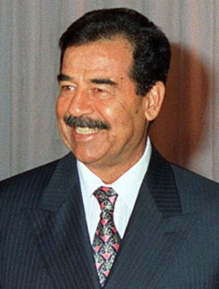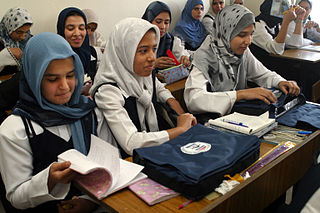See also
| | This Iraqi university, college or other education institution article is a stub. You can help Wikipedia by expanding it. |
It is proposed that this article be deleted because of the following concern:
If you can address this concern by improving, copyediting, sourcing, renaming, or merging the page, please edit this page and do so. You may remove this message if you improve the article or otherwise object to deletion for any reason. Although not required, you are encouraged to explain why you object to the deletion, either in your edit summary or on the talk page. If this template is removed, do not replace it . The article may be deleted if this message remains in place for seven days, i.e., after 13:38, 25 February 2021 (UTC). Nominator: Please consider notifying the author/project: {{ subst:proposed deletion notify |Sheikh Tusi University College|concern=The article has no sources of any kind, making it a total failure of verrifiability}} ~~~~ |
Sheikh Tusi University College is a private Iraqi university established in 2006 in Najaf, Iraq.
| | This Iraqi university, college or other education institution article is a stub. You can help Wikipedia by expanding it. |

Baghdad is the capital of Iraq and one of the largest cities in the Arab world, and compared to its large population it has a small area at just 673 square kilometers. Located along the Tigris, near the ruins of the Akkadian city of Babylon and the ancient Iranian capital of Ctesiphon, Baghdad was founded in the 8th century and became the capital of the Abbasid Caliphate. Within a short time, Baghdad evolved into a significant cultural, commercial, and intellectual center of the Muslim world. This, in addition to housing several key academic institutions, including the House of Wisdom, as well as hosting a multiethnic and multireligious environment, garnered the city a worldwide reputation as the "Centre of Learning".

The economy of Iraq is dominated by the oil sector, which has provided about 99.7% of foreign exchange earnings in modern times. Iraq's hitherto agrarian economy underwent rapid development following the 14 July Revolution overthrowing the Hashemite Iraqi monarchy, becoming the third-largest economy in the Middle East by 1980. This occurred in part because of the Iraqi government's successful industrialization and infrastructure development initiatives in the 1970's, which included irrigation projects, railway and highway construction, and rural electricfication.

The Iran–Iraq War was a protracted armed conflict that began on 22 September 1980 when Iraq invaded neighbouring Iran. The war lasted almost eight years, ending in a stalemate on 20 August 1988 when Iran accepted a UN-brokered ceasefire. Iraq's rationale for the invasion was primarily to cripple Iran and prevent Ayatollah Ruhollah Khomeini from exporting the 1979 Iranian Revolution movement to Shia-majority Iraq and threaten the Sunni-dominated Ba'athist leadership. Iraq had also wished to replace Iran as the dominant state in the Persian Gulf, which was before this point not seen as feasible by the Iraqi leadership due to pre-revolutionary Iran's colossal economic and military might, as well as its close alliances with the United States and Israel. The war followed a long-running history of border disputes, as a result of which Iraq had planned to annex Iran's oil-rich Khuzestan Province and the east bank of the Shatt al-Arab.

Saddam Hussein Abd al-Majid al-Tikriti was an Iraqi politician who served as the fifth President of Iraq from 16 July 1979 until 9 April 2003. A leading member of the revolutionary Arab Socialist Ba'ath Party, and later, the Baghdad-based Ba'ath Party and its regional organization, the Iraqi Ba'ath Party—which espoused Ba'athism, a mix of Arab nationalism and Arab socialism—Saddam played a key role in the 1968 coup that brought the party to power in Iraq.

The Kurdish languages constitute a dialect continuum, belonging to the Iranian language family, spoken by Kurds in the geo-cultural region of Kurdistan and the Kurdish diaspora. The three Kurdish languages are Northern Kurdish, Central Kurdish, and Southern Kurdish. A separate group of non-Kurdish Northwestern Iranian languages, the Zaza–Gorani languages, are also spoken by several million ethnic Kurds. Studies as of 2009 estimate between 8 and 20 million native Kurdish speakers in Turkey. The majority of the Kurds speak Kurmanji. Most Kurdish texts are written in Kurmanji and Sorani. Kurmanji is written in the Hawar alphabet, a derivation of the Latin script, and Sorani is written in the Sorani alphabet, a derivation of Arabic script.
A private military company (PMC) is a private company providing armed combat or security services for financial gain. PMCs refer to their staff as "security contractors" or "private military contractors". Private military companies refer to their business generally as the "private military industry" or "The Circuit".

Erbil Governorate, sometimes referred to by the alternative spelling Arbil Governorate, is a governorate of Iraq in Kurdistan Region. It is the capital and economic hub of the autonomous region of Kurdistan Region.

Duhok, also spelled Dihok is the capital of the Duhok Governorate in Iraq's Kurdistan Region. The city is encircled by mountains along the Tigris river. Duhok has a growing tourism industry. Its population has increased rapidly since the 1990s, as the rural population moved to the cities after villages were destroyed by the Iraqi Army during the 1991 uprisings in Iraq. The University of Duhok, founded in 1992, is a renowned center for teaching and research. The city of Duhok is natively populated by Kurds and Assyrians.
Academi is an American private military company founded in 1997 by former Navy SEAL officer Erik Prince as Blackwater, renamed as Xe Services in 2009 and known as Academi since 2011 after the company was acquired by a group of private investors. The company received widespread notoriety in 2007, when a group of its employees killed 17 Iraqi civilians and injured 20 in Nisour Square, Baghdad, for which four guards were convicted in the U.S., but later pardoned on December 22, 2020 by U.S. president Donald Trump.

Sulaymaniyah, also called Slemani, is a city in the east of the Kurdistan Region of Iraq, not far from the Iran–Iraq border. It is surrounded by the Azmer Range, Goyija Range and the Qaiwan Range in the northeast, Baranan Mountain in the south and the Tasluja Hills in the west. The city has a semi-arid climate with very hot dry summers and cool wet winters.

Education in Iraq is administered by the Ministry of Education.

The International School of Choueifat (ISC) is a collection of private international schools run by SABIS school system in various countries of the Middle East. The first International School of Choueifat was founded in Choueifat, Lebanon in 1886 and later expanded to various parts of the Persian Gulf region. The first Choueifat school in the Persian Gulf opened in Sharjah, United Arab Emirates in 1975 and subsequently others opened in other cities across the Middle East.

The Iraq War was a protracted armed conflict that began in 2003 with the invasion of Iraq by a United States-led coalition that overthrew the government of Saddam Hussein. The conflict continued for much of the next decade as an insurgency emerged to oppose the occupying forces and the post-invasion Iraqi government. An estimated 151,000 to 1,033,000 Iraqis were killed in the first three to four years of conflict. US troops were officially withdrawn in 2011. The U.S. became re-involved in 2014 at the head of a new coalition; the insurgency and many dimensions of the armed conflict continue. The invasion occurred as part of the George W. Bush administration's War on Terror following the September 11 attacks despite no connection of the latter to Iraq.
The term militia in contemporary Iraq refers to armed groups that fight on behalf of or as part of the Iraqi government, the Mahdi Army and Badr Organization being two of the biggest. Many predate the overthrow of Saddam Hussein, but some have emerged since, such as the Facilities Protection Service.

Iraq, officially the Republic of Iraq, is a country in Western Asia, bordered by Turkey to the north, Iran to the east, Kuwait to the southeast, Saudi Arabia to the south, Jordan to the southwest and Syria to the west. The capital and largest city is Baghdad. Iraq is home to diverse ethnic groups, including constitutionally recognized Arabs, Kurds, Turkmen, Chaldeans and Assyrians, as well as other ethnic and ethnoreligious groups like: Yazidis, Shabakis, Armenians, Mandaeans, Circassians, Sabians and Kawliya. Around 99% of the country's 38 million citizens are Muslims, with small minorities of Christians, Yarsans, Yezidis and Mandeans also present. The official languages of Iraq are Arabic and Kurdish.

Karrada is an upper middle class district of the city of Baghdad, Iraq. It has a mixed population of Muslims and Christians. It is one of the most religiously diverse areas of the city, and is one of the two major districts of the Christian community in Baghdad, along with Dora. All of the Christians of the district congregate in Inner Karrada, where most of the Churches are located, with congregations of Chaldeans, Assyrians, Melkite Greeks, and Armenian Catholics. It has two sub-districts, being Nazaith and Masbah. Karrada is on the northern part of the peninsula, which was created by a sharp turn in the Tigris river. As a result, the district has much waterfront property, making it a desirable and expensive district.

Greek–Iraqi relations are foreign relations between Greece and Iraq. Relations of the Greek and Iraqi peoples are deeply rooted in history, both have developed cultures that have influenced the course of humanity. They date as far back as when early Greek scholars of the 1st millennium BC lived and studied in Babylonia and Assyria, to later when Alexander III of Macedon ruled Mesopotamia and would die in Babylon, Iraq. Greece firmly and consistently supports the independence, sovereignty and territorial integrity of Iraq. Greece traditionally maintained good and friendly relations with Iraq due to strong historical and cultural bonds, dating back to ancient times.

Mustansiriyah University is a university in Baghdad, Iraq.

Nasiriyah is a city in Iraq. It is situated along the banks of the Euphrates River, about 360 km southeast of Baghdad, near the ruins of the ancient city of Ur. It is the capital of the Dhi Qar Governorate. Its population 2003 was about 560,000, making it the fourth largest city in Iraq. It had a religiously diverse population of Muslims, Mandaeans and Jews in the early 20th century, but today its inhabitants are predominantly Shia Muslims.

The COVID-19 pandemic in Iraq is part of the worldwide pandemic of coronavirus disease 2019 caused by severe acute respiratory syndrome coronavirus 2. During the pandemic, Iraq reported its first confirmed cases of SARS-CoV-2 infections on 22 February in Najaf. By April, the number of confirmed cases had exceeded the hundred mark in Baghdad, Basra, Sulaymaniyah, Erbil and Najaf.